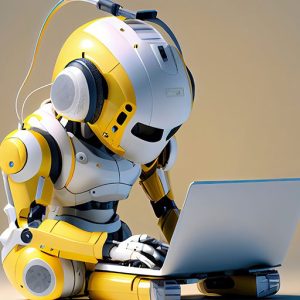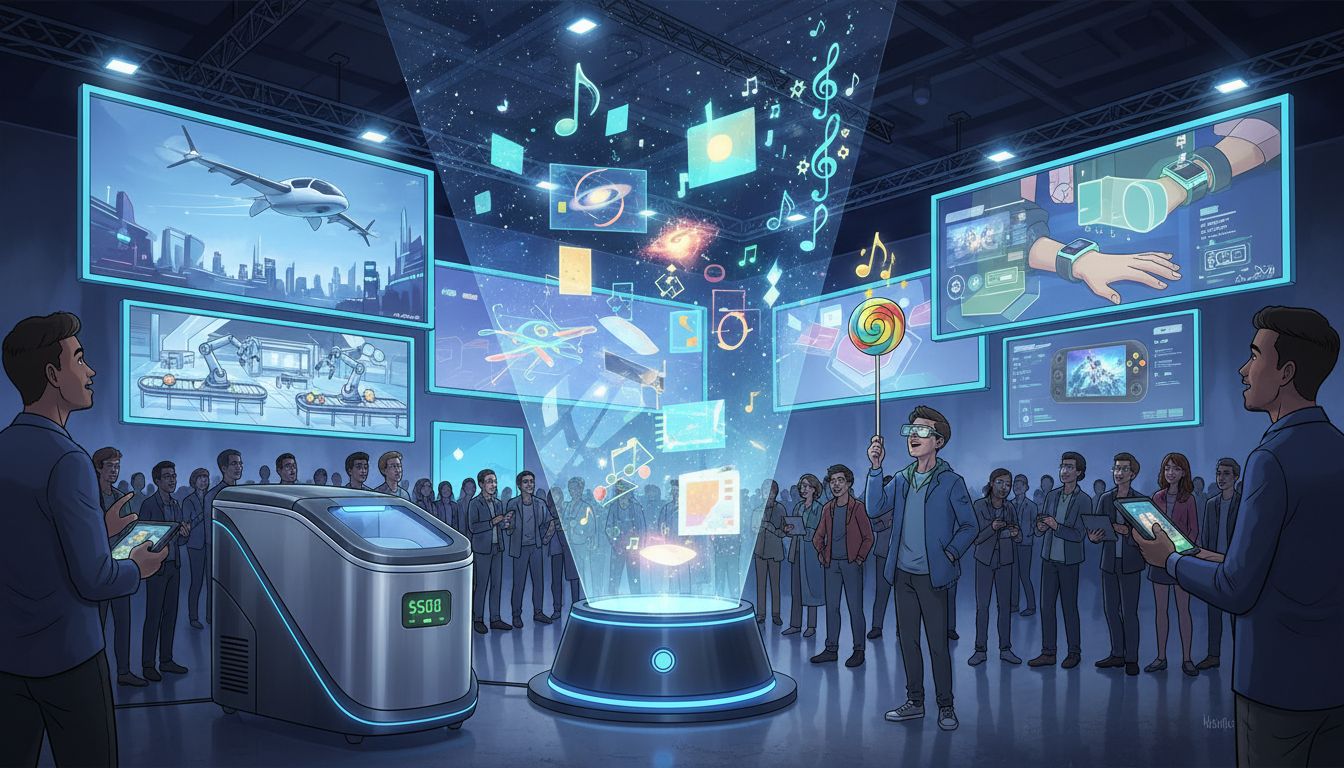Welcome to the world of breaking AI news, where we explore the latest advancements and trends in artificial intelligence across various sectors. Explore how AI is revolutionizing businesses, healthcare, education and research through this post.
Find out how companies are utilizing AI chatbots and machine learning to optimize operations and give customers better experiences. Uncover the benefits and challenges faced by healthcare professionals as they integrate AI technologies into their practices for enhanced diagnostics and treatment plans.
Learn about innovative applications of artificial intelligence in educational settings that empower both educators and students with personalized learning experiences. Finally, stay up-to-date with breaking AI news on recent breakthroughs in machine learning, deep learning algorithms, natural language processing (NLP), as well as new potential applications for this rapidly evolving technology.
Table of Contents:
- AI in Business
- AI in Healthcare
- AI in Education
- Latest Developments in Artificial Intelligence Research
- FAQs in Relation to Breaking Ai News
- Conclusion
1. AI in Business
The rapid advancements in artificial intelligence (AI) have opened up new opportunities for businesses to streamline their operations, improve customer experiences, and gain a competitive edge. Examples of businesses leveraging AI technology will be discussed, along with the associated benefits and challenges of implementing it in business settings.
Benefits of AI for Businesses
- Improved efficiency: By automating repetitive tasks and streamlining workflows, AI can help businesses save time and resources. For example, chatbots can handle routine customer inquiries more efficiently than human agents.
- Better decision-making: With advanced data analysis capabilities, AI can provide valuable insights to support informed decision-making processes. This is particularly useful when dealing with large volumes of data or complex problems.
- Enhanced personalization: Through machine learning algorithms that analyze user behavior patterns, businesses can offer personalized recommendations tailored to individual preferences – improving overall customer satisfaction levels.
Challenges of Implementing AI
Incorporating artificial intelligence into your business comes with its own set of challenges as well:
- Data quality issues: Poor-quality or insufficient data may lead to inaccurate predictions or biased results from an algorithm’s analysis.
- Forbes – The Challenge Of Data Quality In The Age Of Ai
- Lack of technical expertise: Implementing AI solutions often requires specialized knowledge and skills, which may be difficult to find or expensive to acquire.
- Harvard Business Review – Artificial Intelligence for the Real World
- Ethical concerns: As AI becomes more integrated into our daily lives, ethical considerations such as privacy, security, and fairness must be addressed in order to maintain public trust.
- World Economic Forum – Top 10 Ethical Principles for Artificial Intelligence
Examples of Companies Using AI
Many businesses across various industries are already reaping the benefits of artificial intelligence. Here are a few examples:
- Amazon Web Services (AWS): AWS offers a wide range of machine learning services that help companies build intelligent applications without requiring extensive expertise in data science or machine learning.
- Google Search: Google’s search engine uses advanced natural language processing algorithms to understand user queries better and deliver more relevant results quickly.
- IBM Watson: IBM’s Watson platform combines powerful analytics capabilities with natural language understanding technology to provide valuable insights from unstructured data sources like text documents, images, and videos.
AI in business has the potential to revolutionize how companies operate, but it comes with its own set of challenges. Successful instances of businesses utilizing AI can provide valuable insight into the efficacy and potential pitfalls associated with this revolutionary technology. Moving on from this discussion about AI in Business, let’s now explore the use of AI within healthcare settings.
2. AI in Healthcare
Utilizing AI, the healthcare industry is undergoing a radical transformation that can lead to improved patient care, more efficient processes and potentially even life-saving outcomes. By harnessing the power of AI, healthcare professionals can improve patient care, streamline processes, and even save lives. In this piece, we’ll take a look at the advantages and difficulties of introducing AI in healthcare environments while demonstrating some cases of medical facilities that have effectively implemented AI technology.
Benefits of AI for Healthcare Professionals
- Improved diagnostics: With advanced image recognition capabilities, AI can help doctors identify diseases more accurately by analyzing medical images such as X-rays or MRIs. For example, Google’s DeepMind has developed an AI system to detect diabetic retinopathy, a leading cause of blindness worldwide.
- Precision medicine: By leveraging machine learning algorithms to analyze large datasets on genetic information and drug responses from patients with similar conditions, physicians can provide personalized treatment plans tailored specifically for each individual patient.
- Faster drug discovery: Researchers are using artificial intelligence to accelerate the process of discovering new drugs by predicting their effectiveness based on molecular structures or simulating how they interact with human cells. A notable example is Insilico Medicine’s recent success in developing a potential new drug candidate within just 46 days using deep learning techniques.
- Better resource allocation: Hospitals can optimize staffing levels and reduce wait times through predictive analytics powered by AI, ensuring that resources are allocated efficiently and patients receive timely care.
Challenges of Implementing AI in Healthcare Settings
Despite the numerous benefits, there are also several challenges to consider when implementing AI technology in healthcare settings:
- Data privacy concerns: The sensitive nature of medical data raises concerns about patient privacy and security. Ensuring compliance with regulations such as HIPAA (Health Insurance Portability and Accountability Act) is crucial for any organization handling health information.
- Lack of standardized data formats: Inconsistencies in how electronic health records (EHRs) store information can make it difficult for AI algorithms to process and analyze data effectively.
- Ethical considerations: As AI systems become more autonomous, questions arise about their ethical implications, including potential biases or errors leading to misdiagnoses or incorrect treatment recommendations.
- Funding and infrastructure limitations: Integrating advanced technologies like artificial intelligence into existing healthcare systems requires significant investments in both financial resources and IT infrastructure upgrades.
Examples of Hospitals and Clinics Using AI
To illustrate the practical applications of artificial intelligence within the healthcare sector, here are a few examples from around the world where hospitals have successfully implemented this cutting-edge technology:
- The Mount Sinai Hospital in New York has partnered with Zebra Medical Vision to use its deep learning algorithms to analyze medical imaging data, helping radiologists detect diseases such as liver lesions and lung cancer more accurately.
- Johns Hopkins Hospital in Baltimore has implemented an AI-powered system called Sepsis Watch to identify patients at risk of developing sepsis, a life-threatening condition that can lead to organ failure. By detecting early warning signs, the hospital has significantly reduced sepsis-related deaths.
- The Moorfields Eye Hospital in London is collaborating with Google’s DeepMind to develop an AI system capable of diagnosing eye conditions from retinal scans, potentially saving the sight of thousands of patients each year.
As we continue exploring the potential applications and advancements in artificial intelligence within healthcare settings, it becomes increasingly evident that this technology holds great promise for revolutionizing patient care while overcoming various challenges along the way.
AI in healthcare has been a game-changer for medical professionals, with its potential to improve patient outcomes and reduce costs. Educational organizations are now investigating how AI could be employed to benefit them.
3. AI in Education
The integration of artificial intelligence (AI) in education is revolutionizing the way educators and students interact with learning materials, creating more personalized and engaging experiences. Nevertheless, utilizing AI in educational contexts also presents its own set of difficulties that must be addressed.
Benefits of AI for Educators and Students
- Personalized Learning: With the help of AI algorithms, it’s now possible to create customized learning paths for individual students based on their strengths, weaknesses, interests, and goals. This allows learners to progress at their own pace while receiving targeted support where needed.
- Data-Driven Insights: By analyzing student performance data over time, AI can identify patterns and trends that may not be apparent through traditional assessment methods. These insights can inform teaching strategies and interventions tailored to specific student needs.
- Automation: Teachers often spend a significant amount of time on administrative tasks such as grading assignments or tracking attendance. Implementing AI tools like automated essay scoring systems or facial recognition software can free up valuable time for educators to focus on more meaningful interactions with their students.
Challenges of Implementing AI in Education Settings
- Ethical Concerns: The use of personal data collected by AI systems raises privacy concerns among parents and educators alike. Ensuring transparency about how this information is used will be crucial when introducing these technologies into schools.
- Digital Divide: Access to high-quality digital resources remains unequal across different socioeconomic backgrounds worldwide; thus, widening the digital divide. To ensure that AI benefits all students, efforts must be made to provide equal access to technology and resources.
- Teacher Training: Integrating AI into education requires teachers to learn new skills and adapt their teaching methods. Providing adequate training and support will be essential for successful implementation.
Examples of Schools and Universities Using AI
A growing number of educational institutions are embracing the potential of artificial intelligence in various ways:
- Georgia Institute of Technology introduced an AI-powered virtual teaching assistant named Jill Watson, which helps answer student questions on course material through a chat interface.
- The Newton platform, utilized by many schools across the US, takes advantage of machine learning models to personalize instruction for K-12 students depending on their individual requirements.
- In Singapore, primary school teachers have been using an automated essay scoring system during a pilot program aimed at reducing teacher workload while providing more consistent feedback on student writing assignments.
The adoption of artificial intelligence in education is still in its early stages; however, as research progresses and technology advances further, it’s expected that we’ll see even more innovative applications transforming how educators teach and learners engage with content.
AI in education has the potential to revolutionize how students learn and educators teach, but it must be implemented carefully. Given the recent breakthroughs in AI research, we can now leverage its potential to further optimize our learning experiences.
4. Latest Developments in Artificial Intelligence Research
The field of artificial intelligence is constantly evolving, with researchers making significant breakthroughs and developing innovative applications across various industries. In this section, we will delve into some recent advancements in machine learning, deep learning algorithms, new AI applications, and natural language processing research.
Breakthroughs in Machine Learning and Deep Learning Algorithms
Recent progress in ML and DL, two subsets of AI, has been quite remarkable. Researchers continue to develop more efficient algorithms that enable machines to learn from data autonomously or with minimal human intervention. Some notable developments include:
- Google’s LaMDA: Google introduced a groundbreaking conversational model called Language Model for Dialogue Applications (LaMDA), which can engage users in open-ended conversations on any topic.
- OpenAI’s DALL-E: OpenAI developed an impressive generative model named DALL-E capable of creating high-quality images from textual descriptions provided by users.
- FedAvg Algorithm Improvements: Researchers have proposed improvements to the Federated Averaging algorithm used for federated learning – a technique that allows ML models to be trained on decentralized data while preserving privacy.
New Applications for Artificial Intelligence Technology
Beyond traditional uses like image recognition or natural language processing, AI technology has been applied creatively across various sectors:
- AI in Ophthalmology: Google’s DeepMind has developed an AI system that can analyze retinal scans to predict a person’s risk of developing heart disease.
- Researchers have utilized AI to sift through large amounts of biomedical information in order to identify potential new medications, quickening the drug discovery process and cutting costs.
- AI for Climate Change Mitigation: IBM Research is using AI technology to develop models that help optimize energy consumption, reduce emissions, and monitor deforestation, all crucial factors in combating climate change.
Recent Advances in Natural Language Processing
Natural language processing (NLP) research focuses on enabling machines to understand and generate human languages effectively. Some recent advancements include:
- GPT-3 from OpenAI: The third iteration of OpenAI’s Generative Pre-trained Transformer (GPT) model boasts impressive capabilities such as generating coherent text passages based on user prompts or even writing code snippets.
- Facebook’s Universal Speech Recognition System: Facebook AI has developed a universal speech recognition system that can understand multiple languages, enabling seamless communication between users who speak different languages.
- Microsoft’s Turing-NLG: Microsoft introduced its largest language model yet, the Turing Natural Language Generation (Turing-NLG), which excels at tasks like summarization, translation, and question answering.
FAQs in Relation to Breaking Ai News
What are the current issues in artificial intelligence?
Current issues in artificial intelligence include the lack of understanding and control over AI systems, bias in data sets used to train algorithms, privacy concerns related to collecting personal data for machine learning models, ethical considerations when using AI technology for decision-making processes, economic implications of job displacement due to automation, and safety risks associated with autonomous vehicles. Furthermore, there is a requirement for better interaction between humans and machines as well as more visibility regarding how decisions are taken by AI models.
1. Loss of Jobs:
AI has the potential to automate certain jobs, leading to a decrease in employment opportunities and increased competition for remaining positions.
2. AI can be employed to amass data about people without their awareness or authorization, which could possibly lead to breaches of privacy rights.
3. Security Risks:
The use of AI systems can create vulnerabilities that could be exploited by malicious actors, resulting in data breaches and other cyber-attacks with serious consequences for organizations and individuals alike.
What is controversial issue about AI?
A controversial issue about AI is the potential for misuse of data and algorithmic bias. Data could be used to show prejudice against certain demographics, for instance those based on ethnicity or gender, which can lead to inequitable results in areas such as job selections and credit approvals. Algorithms can also be trained with biased datasets that lead to incorrect predictions or results that reflect existing biases rather than objective truth. This could result in a lack of trust in AI systems which may limit their use and effectiveness.
What is the impact of AI today?
AI is having a transformative effect on our lives, revolutionizing everything from healthcare to transportation. From healthcare to transportation, AI has revolutionized the way we interact with technology and its potential applications are still being explored. In business, AI can automate processes, improve customer experience and increase efficiency while reducing costs. On the consumer side, it can be used for personalized recommendations in e-commerce or voice assistants that make life easier. AI is transforming the way people operate and exist, granting fresh possibilities for expansion and invention across all sectors.
Conclusion
In summary, AI has made impressive progress and is expected to continue its rapid growth in the near future. From business applications to healthcare advancements, AI is revolutionizing many industries. It’s undeniable that the AI sphere will only become more and more dynamic as time progresses, with numerous reports about fresh research and tech appearing daily. With its wide range of potential uses, it’s exciting to think about what kind of breakthroughs are still yet to come from the world of Artificial Intelligence.






